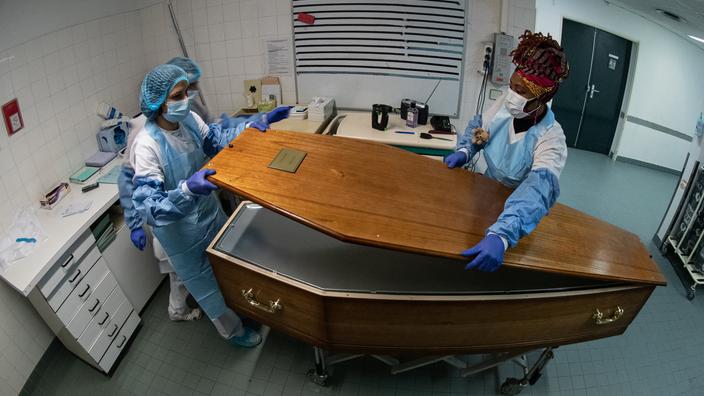What will we remember about the coronavirus?
The memory of the epidemic, like the others, will be selective.
One year after the start of the spring 2020 containment, the town hall of Levallois-Perret was the first city in France to hold, Wednesday March 17, a tribute ceremony for the victims of the coronavirus, in the presence of elected officials and the vice -President of the Senate Roger Karoutchi.
A wreath of flowers, a few words and above all a silence for those who left "
like plague victims
", according to Lionel Petitpas, president of the association Victims of Covid-19.
“Our deceased were buried in covers, without ceremony or goodbye.
The Nation must recognize that this situation was degrading for these people
”, he affirms.
Read also: Deaths of Covid-19: when the families of victims denounce a "sorting" in the hospital
The Victims of Covid-19 and Coeur-Vide 2019 associations have been calling for the creation of a national day of mourning for the victims of the coronavirus for several months.
For Julie Grasset, whose father and brother were mowed down by the first wave of the coronavirus, this is a necessity.
“The families of the victims of the first wave are facing something on the order of impossible mourning.
We couldn't say goodbye to our loved ones,
”she explains.
The last image of his father, Patrick, a 67-year-old nurse who died at his home last March, remains that of
“an urn placed on a desk”.
"
It's as if we have denied their existence," he
testifies.
Day of caregivers, or victims?
As the count of the death toll from Covid-19 approaches 2.7 million people worldwide, many countries have already put in place memorial devices.
National commemoration day March 11 in Canada, specific memorial in Florida, ten days of national mourning in Spain ... But in France, the government remains cautious.
"Discussions are underway regarding the establishment of a day dedicated to the memory of those who have been swept away by this scourge,"
said the Elysee in a letter addressed to associations.
Without further details.
Is the project premature?
“As long as there are 300 deaths a day, it's complicated to do [the tribute].
It is not a philosophical choice, it is a choice of common sense
”justified the entourage of the Prime Minister, Jean Castex, at
Liberation
.
Perhaps the form of this tribute is also debated within the government.
All the more so as the Fédération Hospitalière de France (FHF) wishes to make March 17 a
“national hospital day
”, in order to make the date a meeting of tribute and memory, but also “
a time for debate. on the state of our public health system
”.
The initiative was "
greeted by Emmanuel Macron"
, according to the president of the FHF, Frédéric Valletoux.
Behind the terminology, a "
political choice
"
National day of mourning, unique or annual ceremonies: behind the choice of words, hides a way of writing history.
“Collective memory is built in a contemporary way to events.
The French State has a very unique responsibility in the memory regime that it is going to put in place.
This shared narrative will be what will remain of this experience and must lead, collectively, to resilience, ”
analyzes Denis Peschanski, historian, research director at the CNRS and co-responsible for the November 13 memory program.
Celebrating the caregivers, or the victims, he explains, is a matter of political choice:
“Setting up a recurring demonstration for the dead implies considering the figure of the victim as structuring of collective memory.
However, I am not sure that this is the memory that the government wants to retain, ”
explains Denis Peschanski.
Lately, says the historian, the figure of the hero has been brought to light more than those of the victims:
“For the government, this image of caregivers applauded every evening refers to the image of a standing France, of a collective reconstruction, not that of emergency and failure. ”
To read also: Stéphanie Bataille: "Our thirty testimonies of the ordeal of families, read by actors"

